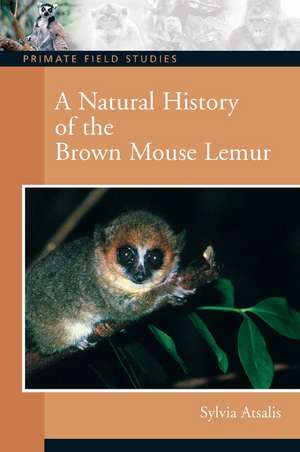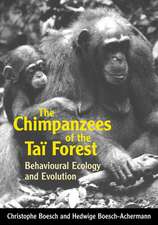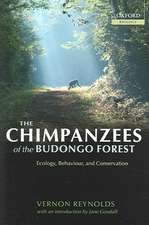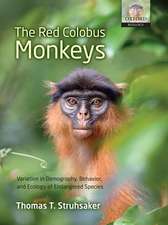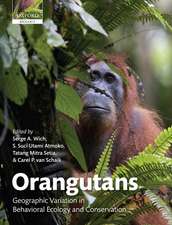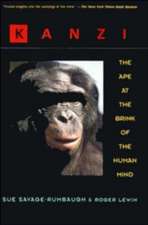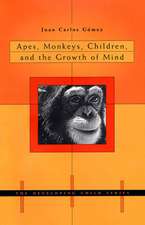A Natural History of the Brown Mouse Lemur: Primate Field Studies
Autor Sylvia Atsalisen Limba Engleză Paperback – 9 oct 2007
Preț: 379.08 lei
Nou
Puncte Express: 569
Preț estimativ în valută:
72.59€ • 74.88$ • 60.16£
72.59€ • 74.88$ • 60.16£
Carte tipărită la comandă
Livrare economică 20 februarie-06 martie
Preluare comenzi: 021 569.72.76
Specificații
ISBN-13: 9780132432719
ISBN-10: 0132432714
Pagini: 256
Dimensiuni: 152 x 229 x 15 mm
Greutate: 0.36 kg
Ediția:1
Editura: Taylor & Francis
Colecția Routledge
Seria Primate Field Studies
Locul publicării:Oxford, United Kingdom
ISBN-10: 0132432714
Pagini: 256
Dimensiuni: 152 x 229 x 15 mm
Greutate: 0.36 kg
Ediția:1
Editura: Taylor & Francis
Colecția Routledge
Seria Primate Field Studies
Locul publicării:Oxford, United Kingdom
Public țintă
UndergraduateCuprins
Contents *List of Figures *List of Tables *List of Pictures *Prologue and Acknowledgements Chapter One: Mouse Lemurs, The World's
Smallest Primates *The Cheirogaleidae *Researching the Brown Mouse Lemur *Mouse Lemur Distribution *Distinctive Features of the Cheirogaleidae
Chapter Two: Researching The Brown Mouse Lemur *Description of the Study Site *Rainfall and Temperature Patterns *Phenological Monitoring
*Flowering and Fruiting Patterns *Insect Abundance *Live-Trapping Mouse Lemurs *Observing Mouse Lemurs Chapter Three: Diet and Feeding
Ecology *The Diet of Mouse Lemurs *Investigating Diet in the Brown Mouse Lemur *Use of Plants and Prey *Frugivory *Bakerella, the fruit of
preference *Beetles, the prey of preference *Other organic matter found in fecal samples *Fruit: availability and consumption *Phytochemical analysis
of fruits eaten *Animal prey: availability and consumption*Observations of Mouse Lemurs Feeding *Mouse Lemurs and Mistletoes *Mouse Lemurs and
Beetles *Comparing the Diets of Mouse Lemur Species *What Can Mouse Lemurs Tell Us About Primate Origins *Fecal Sampling as a Way to Study
Diet *Suggested Directions for Future Studies *Chapter Summary Chapter Four: Seasonal Changes in Body Mass and Activity Levels *How Small
Mammals Respond to Climatic and Resource Fluctuations *Seasonl Fluctuations in the Cheirogaleidae *Investigating Seasonal Flucutations in the
Brown Mouse Lemur *Fattening and Hibernation *Population Fluctuations in Body Mass, Tail Circumference and Activity Levels *Differences in
Seasonal Response *Comparing Seasonal Responses of Mouse Lemur Species *Emerging from Hibernation *Sleeping Nests *The Effects of Trapping
*Suggested Directions for Future Studies *Chapter Summary Chapter Five-The Social Life of the Brown Mouse Lemur *Sociality in Nocturnal
Strepsirrhines *Investigating Social Organization in the Brown Mouse Lemur *Social Interactions of the Brown Mouse Lemur *Trap Data and Spatial
Distribution *Changes in Population Composition *The Solitary Mouse Lemur *Spatial Distribution of Males and Females *Migration Patterns and
Population Continuity *Population Residents *Scramble and Contest Competition *Suggested Directions for Future Studies *Chapter Summary
Chapter Six-Reproduction in Mouse Lemurs *Reproductive Patterns of Mouse Lemurs *Assessing Reproductive Condition in the Brown Mouse Lemur
*Estrous Cycles, Gestation, and Births *Reproductive Seasonality *The Advantages of Estrous Synchrony
x
Smallest Primates *The Cheirogaleidae *Researching the Brown Mouse Lemur *Mouse Lemur Distribution *Distinctive Features of the Cheirogaleidae
Chapter Two: Researching The Brown Mouse Lemur *Description of the Study Site *Rainfall and Temperature Patterns *Phenological Monitoring
*Flowering and Fruiting Patterns *Insect Abundance *Live-Trapping Mouse Lemurs *Observing Mouse Lemurs Chapter Three: Diet and Feeding
Ecology *The Diet of Mouse Lemurs *Investigating Diet in the Brown Mouse Lemur *Use of Plants and Prey *Frugivory *Bakerella, the fruit of
preference *Beetles, the prey of preference *Other organic matter found in fecal samples *Fruit: availability and consumption *Phytochemical analysis
of fruits eaten *Animal prey: availability and consumption*Observations of Mouse Lemurs Feeding *Mouse Lemurs and Mistletoes *Mouse Lemurs and
Beetles *Comparing the Diets of Mouse Lemur Species *What Can Mouse Lemurs Tell Us About Primate Origins *Fecal Sampling as a Way to Study
Diet *Suggested Directions for Future Studies *Chapter Summary Chapter Four: Seasonal Changes in Body Mass and Activity Levels *How Small
Mammals Respond to Climatic and Resource Fluctuations *Seasonl Fluctuations in the Cheirogaleidae *Investigating Seasonal Flucutations in the
Brown Mouse Lemur *Fattening and Hibernation *Population Fluctuations in Body Mass, Tail Circumference and Activity Levels *Differences in
Seasonal Response *Comparing Seasonal Responses of Mouse Lemur Species *Emerging from Hibernation *Sleeping Nests *The Effects of Trapping
*Suggested Directions for Future Studies *Chapter Summary Chapter Five-The Social Life of the Brown Mouse Lemur *Sociality in Nocturnal
Strepsirrhines *Investigating Social Organization in the Brown Mouse Lemur *Social Interactions of the Brown Mouse Lemur *Trap Data and Spatial
Distribution *Changes in Population Composition *The Solitary Mouse Lemur *Spatial Distribution of Males and Females *Migration Patterns and
Population Continuity *Population Residents *Scramble and Contest Competition *Suggested Directions for Future Studies *Chapter Summary
Chapter Six-Reproduction in Mouse Lemurs *Reproductive Patterns of Mouse Lemurs *Assessing Reproductive Condition in the Brown Mouse Lemur
*Estrous Cycles, Gestation, and Births *Reproductive Seasonality *The Advantages of Estrous Synchrony
x
Notă biografică
Sylvia Atsalis is Coordinator of the Student Center for Science Engagement at Northeastern Illinois University. She has over twenty years experience teaching, advising, and offering professional development to students in STEM disciplines.
Descriere
This text can be used for any undergraduate or graduate course with a primate behavior or primate ecology component. It can also be used as supplemental reading, for any advanced animal behavior class. There are very few books that address the biology of nocturnal primates. There are even fewer that delve with any detail regarding the behavior of specific species. These animals are difficult to follow. Their diminutive size, the thickness of the vegetation, and their nocturnal habits, make the study of their habits a demanding task.Through a trial of patience, Sylvia Atsalis has undertaken this task. Here she provides an in depth view at the life and behavioral patterns of these tiny primates. A Natural History of the Brown Mouse Lemur provides the most complete look at the behavior and ecology of mouse lemurs.
